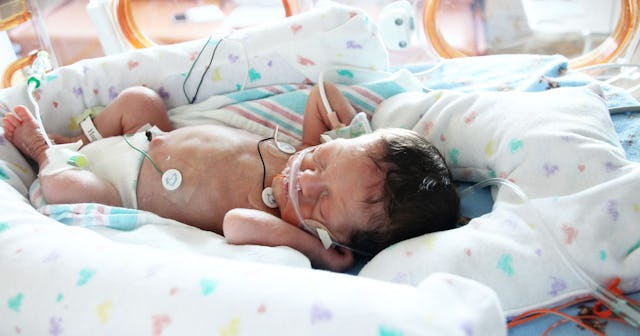My Twins Were Born At 27 Weeks

Trigger warning: child loss
Despite my healthy pregnancy and doing everything “right,” my twins were born at 27 weeks gestation, about 90 days before their due date. I didn’t even make it into the third trimester. Like most parents of preemies, I was completely unprepared for our new life in the neonatal intensive care unit (NICU).
My babies were delivered via emergency C-section and whisked away to fight for their lives. I didn’t get to see them until several hours after they were born. I was terrified, overwhelmed, and ashamed. Yet, I quickly realized that I had it easy. I was not the one fighting for my life. My babies’ organs were underdeveloped. Their skin was thin and flimsy. Their bodies were smaller than most toy dolls.
We often hear about how difficult it is to be a NICU parent. It’s hard to hand over your most basic parental responsibilities to professionals. It’s hard to express breast milk every two hours around the clock for months. It’s hard to cope with all of the uncertainties of the NICU, not knowing how or if your baby will overcome her precarious start to life. Intense feelings of shame and guilt often weigh heavy on NICU parents, even when we know rationally it’s not our fault.
It is physically and emotionally exhausting to be a NICU parent, but what is it like to be a preemie? What is it like to be isolated in a plexiglass box for hours, days, weeks, or even months, when developmentally, you’re still supposed to be engulfed in your mother’s warmth?
Courtesy of Jennifer Canvasser
What is it like to be forced to breathe, eat, and regulate your body temperature when you are not physically ready to do these things?
Preemies are resilient, yet the obstacles they must overcome are profound.
I watched my babies struggle to breathe. And, when they failed to breathe, I watched as breathing tubes were shoved down their throats. I watched in agony when the surgeons had to take my babies to the OR. I watched in desperation, hoping my babies would somehow be okay. And, my heart ached every night for months when I had to leave the NICU until the sun came up again.
Courtesy of Jennifer Canvasser
Without modern medicine, my twins would not have lived more than a day. Level IV NICUs care for the sickest, most vulnerable babies. Sophisticated interventions and specialized clinicians care for babies who would otherwise never survive.
Being born too soon means preemies are susceptible to loads of serious complications. Tragically, 324 days after my twins were born, my son Micah died from complications of necrotizing enterocolitis, a severe intestinal disease. Yet, his twin surpassed all expectations and is now vibrant and healthy. This paradoxical experience, of having one twin die and the other thrive, demonstrates the unpredictable reality of being born too soon.
November is Prematurity Awareness Month. According to the March of Dimes, in the U.S., 1 in 10 babies is born prematurely each year. Just three decades ago in the U.S., many very-low-birth-weight babies did not survive. Today, more preemies are surviving and thriving than ever before. You can join the NEC Society in honoring the strength of preemies, the dedication of their families, and the extraordinary care of NICUs, by recognizing Prematurity Awareness throughout the month of November and World Prematurity Day on November 17.
The NEC Society is a 501(c)(3) nonprofit organization dedicated to building a world without necrotizing enterocolitis (NEC). NEC is a devastating intestinal disease that affects babies in their first weeks and months of life. Infants born prematurely or with a medical condition are most vulnerable to NEC. Visit NECsociety.org to learn more.
This article was originally published on